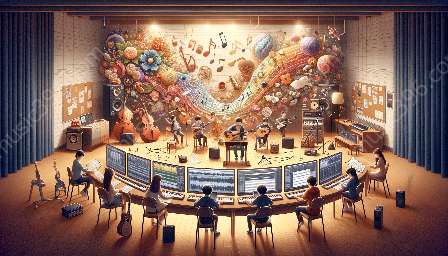In today's interconnected world, technology has revolutionized the way music is created, shared, and exchanged across cultures. This has led to a rich landscape of cross-cultural music exchange, where artists from different backgrounds collaborate and showcase their musical traditions to global audiences.
Technology plays a pivotal role in facilitating cross-cultural music exchange, providing platforms and tools for artists to connect, collaborate, and create music that transcends cultural boundaries. This topic cluster explores the impact of technology on cross-cultural music exchange, its relevance to cross-cultural music studies, and its intersection with music and culture.
The Influence of Technology on Cross-Cultural Music Exchange
Advancements in digital recording, production software, and online distribution platforms have democratized the music-making process, allowing artists from diverse cultural backgrounds to produce and share their music with a global audience. This has catalyzed a wave of cross-cultural collaboration, where musicians fuse traditional elements with modern genres, resulting in a dynamic fusion of sounds and styles.
Enabling Cross-Cultural Collaboration
Technology has dissolved geographical barriers, enabling artists from different parts of the world to collaborate seamlessly. Virtual studios and online communication tools facilitate real-time music production and collaboration, fostering cross-cultural musical dialogues and creative exchange. This has led to the emergence of hybrid music genres that reflect the diverse influences of collaborating artists.
Preserving Cultural Heritage
Technology has also played a crucial role in preserving and promoting traditional music and cultural heritage. Digitization and archiving tools have allowed for the preservation of indigenous music, ensuring that it is accessible to future generations. Furthermore, digital platforms have provided a global stage for traditional musicians to share their cultural heritage and expand their reach beyond local borders.
Challenges and Opportunities
While technology has significantly enhanced cross-cultural music exchange, it also presents challenges. Issues such as cultural appropriation, ownership of traditional music, and ethical considerations in cross-cultural collaboration require careful navigation. However, the opportunities for cultural exchange, mutual learning, and artistic innovation far outweigh these challenges, offering a platform for celebrating diversity through music.
Implications for Cross-Cultural Music Studies and Music and Culture
The study of cross-cultural music exchange in the context of technology provides valuable insights into the ways in which music serves as a conduit for intercultural dialogue and understanding. It offers an interdisciplinary approach to understanding the impact of technology on music, culture, and identity. Furthermore, the cultural, social, and political implications of cross-cultural music exchange offer rich avenues for exploration within the realm of music and cultural studies.
In conclusion, the intersection of technology and cross-cultural music exchange is a dynamic and evolving field that continues to shape the global musical landscape. By embracing technology as a tool for creative collaboration and cultural preservation, musicians are paving the way for a more connected and inclusive music industry. This convergence of technology, cross-cultural music studies, and music and culture offers a fertile ground for academic exploration and creative expression, enriching our understanding of the diverse tapestry of music across the globe.






















